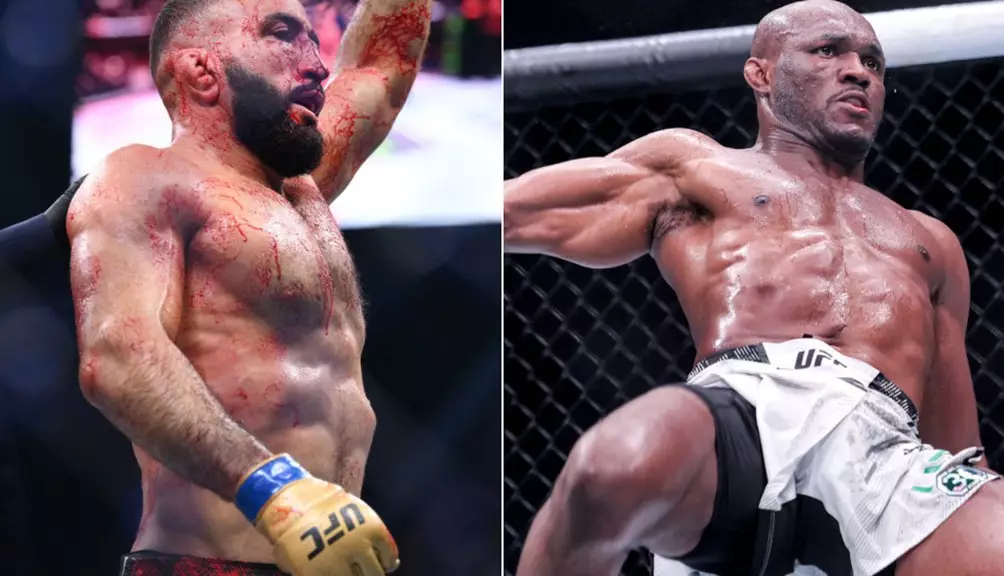In the world of mixed martial arts (MMA), rivalries and confrontations are part of the spectacle, often creating intense narratives that encapsulate the sport. Recently, UFC welterweight champion Belal Muhammad voiced his astonishment over former champion Kamaru Usman’s comments regarding the welterweight division’s current landscape, particularly criticizing Muhammad and Islam Makhachev for their choice not to face each other. In a genre where performance speaks volumes, Muhammad’s sharp rebuttal throws light on both Usman’s current career struggles and a broader perspective on what it means to be a champion.
Usman’s remarks came during an episode of his podcast, where he expressed disappointment over the apparent unwillingness of certain champions to engage with each other. However, Muhammad seized on this opportunity to point out the irony within Usman’s comments. At one point in his career, when Usman was reigning supreme in the welterweight division, he notably avoided a fight with Israel Adesanya, a situation Muhammad highlighted as hypocrisy. This establishes a pattern of a champion who, rather than pursuing immense challenges, instead opted for familiar opponents and rematches, raising questions about the integrity required to hold such a title.
Muhammad articulated his frustration around Usman’s current demeanor. After all, it’s unusual for someone who is currently languishing on a three-fight losing streak – particularly notable in a combat sport where consecutive defeats can mar a fighter’s legacy – to assume a top-tier status while coasting through podcast appearances. The juxtaposition between Usman’s past achievements as a five-time title defender and his present situation cannot be overlooked. From Muhammad’s perspective, Usman should redirect his energies toward reigniting his career rather than acting as a judge for fighters still actively climbing the hierarchy.
The downward trajectory of Usman’s career has been sobering. Once deemed as one of the best welterweights in history, Usman’s defeat against Leon Edwards, followed by another loss in their rematch and then a disappointing performance against Khamzat Chimaev, reflects a significant decline. Each of these setbacks calls into question Usman’s ability to compete at the highest level, raising alarms not only about his place in the welterweight division but also about the strategic decisions he made as champion.
Muhammad’s critiques extend deeper than Usman’s recent form; they also skilfully delve into Usman’s history of opponent selection. Belal argued that Usman never actively sought challenges against fighters who posed greater risks, particularly those on winning streaks. In doing so, Muhammad reminds the audience that the true essence of being a champion lies in the willingness to face the best and take risks. For him, Usman’s title defenses felt more like convenient choices than bold decisions. This notion fosters a debate about what constitutes a legitimate champion, particularly in a sport that prizes achievement and proficiency through rigorous competition.
Despite the barbs directed at Usman, Muhammad displays a certain respect for the former champion’s legacy, acknowledging that Usman still holds a significant name within the division. Instead of dismissing Usman’s future entirely, Muhammad presents a scenario whereby Usman can re-establish himself—a process that involves stepping back into the octagon and securing a victory against robust contenders. This indicates Muhammad’s understanding of the dynamics of sports where redemption is possible through hard work and perseverance.
Muhammad’s insights are a clarion call for Usman to prioritize competitive integrity above all else. Dismissing potential matchups with fighters like Kevin Holland or Jack Della Maddalena because he views them as inferior contends to the ongoing narrative of a fighter who is clinging to a past glory rather than seeking to reclaim his status. By choosing to wait rather than engage, Usman risks becoming a relic of a bygone era rather than a contender in today’s ever-evolving MMA landscape.
The juxtaposition between Belal Muhammad’s current championship mindset and Kamaru Usman’s recent commentary presents a vital discussion about the nature of competition, respect, and legacy within professional sports. The future of the welterweight division seems clouded by transitions and setbacks, and the example set by Usman’s commentary serves as a reminder that the journey of a champion does not end with a title; it is tested and defined by the quality of opposition faced and the willingness to adapt.

